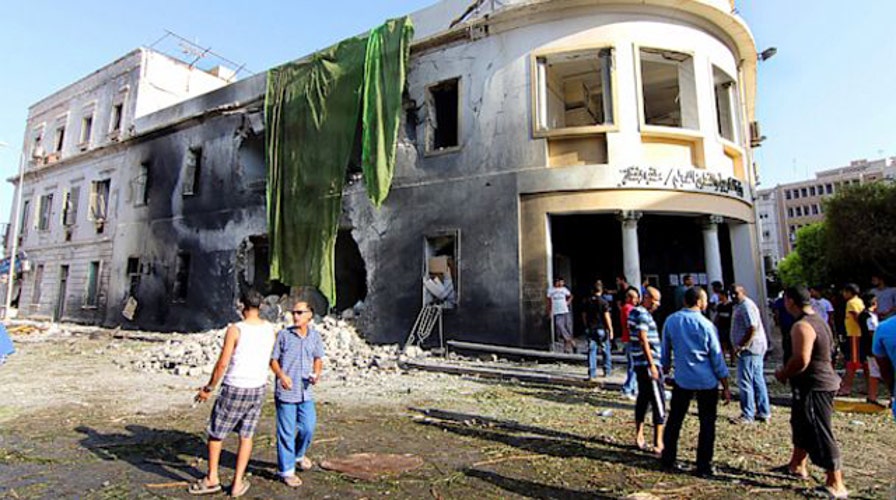NY Times doing PR work for Hillary, WH on Benghazi?
Who benefits most from the 'Paper of Record's' report that Al Qaeda was not involved in the deadly Sept. 11 Benghazi attack?
This is a rush transcript from "On the Record," December 30, 2013. This copy may not be in its final form and may be updated.
DANA PERINO, 'ON THE RECORD' GUEST HOST: There is growing outrage over a "New York Times" report on Benghazi. According to the "New York Times," its investigation turned up no evidence that al Qaeda played a role in the deadly attack on our consulate on September 11, 2012. The newspaper also reporting that the attack was partly fueled by anger at that American-made anti-Islam video, the one the administration, Obama administration, first blamed for the violence. But sources, who were on the ground in Benghazi that night, are calling those claims completely false.
Congressman Trey Gowdy joins us here.
Congressman, what do you think the "New York Times" got wrong?
REP. TREY GOWDY, R-S.C.: Well, first of all, Dana, I want to congratulate the "New York Times." It only took 15 months to figure out how to spell Benghazi. So in another 15 months, maybe their reporting will actually catch up with the truth.
Two things they got wrong. Number one, the video was translated into Arabic in early September of 2012. Early September of 2012 is when that video was translated into Arabic. What in the world explains the violence in Benghazi prior to the video being translated and released? Our consulate was attacked way before the video was released. The British ambassador was almost assassinated way before the video was released. The International Red Cross was attacked twice in Benghazi well before this video was ever released. So if the video is really the impetus for the violence, what in the world explains the violence prior to the release of the video?
Secondarily, with respect to al Qaeda, whether it was al Qaeda or a subsidiary or a holding company or a limited partnership, to quote Hillary Clinton, "What difference does it make"? Who cares whether it was al Qaeda proper or a subsidiary? Four Americans are dead and it wasn't a spontaneous reaction to a video. It was planned.
PERINO: Yesterday, on "FOX News Sunday" both Congressman Mike Rogers and Congressman Adam Schiff, a Republican and a Democrat, both said that they thought the "New York Times" was wrong, based on their investigation. And chairman of the Intel Committee. I have to imagine that they have access to some information. They think the "New York Times" is wrong. Who should the American people believe in all of this?
GOWDY: Well, I will tell you who they should believe. They should believe Mike Rogers, who is a former FBI agent, and Adam Schiff, who happens to be in a different party, but I respect him greatly. He's a former federal prosecutor. Both of those men dedicated their lives to following the facts wherever they take you, without respect to trying to prop up anybody's political career, without respect to trying to damage anyone. Wherever the facts go, that's where they go. So the fact that Adam and Mike Rogers both debunk this "New York Times" article in addition to the people who were on the ground that night. Good investigators talk to everybody, not just folks whose testimony may buttress your position, but they talk to everybody. The fact that some people are coming out today and debunking the mythologies reported by the "New York Times" reporter, I think is instructive.
PERINO: Does the report tell us -- does his reporting, David Kilpatrick of the "New York Times," and also the reporting that the committees have done on the Hill, does it tell us that maybe we had some intelligence failures of our own that we need to address so that we can make sure that our embassies are protected?
GOWDY: Dana, I thought we had no business being in Benghazi. We were the last flag flying in Benghazi. So to the extent that this "New York Times" article tells us what we already knew, we had no business being in Benghazi.
But that begs a bigger question. Why were we there? Why was Chris Stevens in Benghazi that night?
And I have read this "New York Times" article, Dana, six times. I want you to read it six times and tell me if you can tell who the secretary of state was when Benghazi happened. Because her name wasn't mentioned a single solitary time in this exhaustive "New York Times" piece. Not once.
PERINO: And yet, most people, when they read the piece, assumed that the "New York Times" was trying to clear the deck so that Hillary Clinton wouldn't have to deal with Benghazi in a potential presidential run.
GOWDY: Oh, heavens no. That couldn't possibly have been their motivation, would it be, to support a Democrat who was running for the White House? Oh, heavens, no.
PERINO: I have to tell you, Congressman, I love your cynicism.
GOWDY: Well, it is cynicism.
PERINO: And I mean that in all sincerity.
(LAUGHTER)
GOWDY: And the fact that the editor of the "New York Times" had to explain today --
PERINO: Yes.
GOWDY: -- that they haven't yet endorsed anyone for 2016, all you have to do is read the paper, and can you tell who they have endorsed, and what political ideology they have endorsed. But, again, I congratulate them on figuring out that Benghazi happened and that it's a really big deal.
PERINO: All right. Well, we are going to stay on this story.
Congressman, thank you so much.
GOWDY: Happy New Year.

